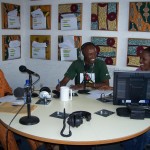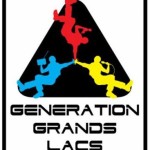SFCG in Burundi: a retrospective of success
By Anne-Lise Seve
With the fiftieth anniversary of Burundi’s independence on the 1st of July 2012, the capital city of Bujumbura was in a fever of excitement. After weeks of preparation, a five hour parade was organized. Every part of Burundian society was present: the different municipalities, the associations, the religious communities, the schools, the main shops of the city, the various ministries, the army etc. The tambourinaires, traditional drummers, gave rhythm to the day and accompanied every Burundian’s joy and enthusiasm. This event takes on great importance because of the symbolic message it conveys.

A Burundian drumming circle at an SFCG festival to promote intercultural dialogue and reconciliation.
During these last 50 years of independence, Burundi’s history has been sullied by hatred, violence, and death. Much like the other Great Lakes countries, Burundi’s population is composed of three ethnic groups: Hutus, Tutsis, and Twas. They share a language and culture and lived in relative peace until colonization, when the separation between them was rigidified. The colonizers chose Tutsis to rule the country and belittled Hutus as they were deemed less intelligent. Since independence, Burundi has been plagued by cyclical violence between the two ethnic groups as they each struggled for power and for their survival. An ethnic war started in 1993 and hundreds of thousands of lives were lost. The Arusha Agreements for Burundian peace and reconciliation, signed in 200O by the political actors of the conflict, launched a peace process supported by the international community. Today, war and ethnic tensions appear to be a problem of Burundi’s past. The fiftieth anniversary of independence is therefore a symbolic moment in Burundi’s history; it is a way to show the world that Burundians are now starting a new era of peace, moving towards economic development and away from violent conflict.
SFCG’s Work in Burundi

Female members of the Women’s Center for Peace marching to raise awareness and promote reconciliation between the two ethnic groups during the war.
In this context, Search for Common Ground, established in Burundi in 1995, has actively participated in reaching this relatively peaceful situation. Through a wide variety of projects, SFCG Burundi has been working to reconcile communities that had been torn apart during the war. SFCG organized meetings between key people as well as cultural events to bring people together. The goal was always to promote mutual understanding and foster the development of peaceful avenues to solving conflicts. The Women’s Center for Peace was also established to create a place where women from both ethnic groups could meet each other and work together to bring back peace.
The Jamaa Association was created by Adrien Tuyaga in 1995 to help young people dealing with the conflict. After collaborating with SFCG, Adrien provided this testimony about SFCG’s work in Burundi:
“SFCG’s vision was to find a common ground, to give an opportunity to people to meet each other and to facilitate the resolution of ongoing conflicts between them. Back then, in 1995, the country and the cities were completely Balkanized. If a Hutu wanted to work or to buy goods in a Tutsi zone, he could not enter it without being killed and vice versa. SFCG has done incredible work to resolve this situation. It has identified the leaders of each community in order to individually convince them to participate in meetings with enemies’ leaders. During those meetings solutions to their conflicts were found as leaders understood it was in their common interest to collaborate. The strategy was to reconcile those leaders first, which would enable impacting the rest of the population thanks to the influence they had. […] Hundreds of projects were carried out by SFCG all over the country, with refugees, youth, women, etc. SFCG was all over the place and even peasants in a remote area would know about SFCG.”
Radio Programming
Another great achievement of SFCG in Burundi is the creation of Studio Ijambo (“speech” in Kirundi). It aimed to break the monopoly of National Radio and Television and to provide the neutral and reliable information that was lacking on Burundi’s radio waves. The idea was also to contribute to the rapprochement of the communities with the help of programs spreading appeasement messages and delivering key knowledge on how to peacefully resolve conflicts. Most Burundians listen to the radio even in remote areas which makes it the best tool to reach the breadth of the population. Fiacre Mnezero, one of the founders and former journalists of the radio describes with passion the work that has been done.
“SFCG, through its radio, was able to establish a political dialogue such as the one Nelson Mandela and Nyerere have brought in their countries. Everyone knew Studio Ijambo and knew they could trust it, especially the politicians and the rebels. Each leader was given the same time of speech and we did not support one side more than the other which was surprising for them. The dialogue was taking place during the radio programs and a lot of things were also discussed off radio. In a way, I think the dialogue we enabled laid the foundation for the Arusha Agreements, those agreements were a consecration for SFCG’s work.”
Amicie Ali, one of the SFCG’s drivers with more than 10 years’ experience, adds:
“When journalists were going into the jungle to meet the rebels it was very dangerous and their lives were at stake. But we used to call the leaders of the rebels and tell them: ‘Be careful, we are sending journalists in your area’ and the rebels would reply, ‘Don’t worry, nothing will happen to them, we will protect them’.”

Studio Ijambo aims to give every Burundian the opportunity to express themselves and participate in political debate.
In 2002 a second radio studio, Radio Isanganiro (“crossroads” in Kirundi), was created and today both studios are very popular. They have gained strong reputations as neutral, third-party actors that provide informative, solutions-oriented radio programming, complemented by intensive community-based outreach activities. The programs have facilitated democratic debate and a culture essential to creating lasting peace.
Empowering Marginalized Groups
Since the end of the conflict, SFCG Burundi has worked to heal the lasting wounds of war. SFCG’s unique and innovative tools, such as participatory theater, have helped repatriate and reintegrate refugees through effective information sharing. SFCG Burundi’s activities

The Women’s Center for Peacebuilding was one of SFCG’s first initiatives to promote marginalized voices in Burundian politics.
also focus on vulnerable people like youth and women. The project nawe arashoboye (“she can too”) aims to empower women through the use of trainings that deliver key knowledge and skills to help women express themselves, negotiate, lobby, and advocate. Joyeuse-Pamela Dushime, a motivated young student in Bujumbura, considers these training “the beginning of a great change in her life” because, through them, she learned how to better defend women’s rights.
Those are only a few examples of what SFCG has done in Burundi but one thing is for sure, all of those actors and witnesses of SFCG’s work agree with the fact that SFCG has contributed substantially to ending the conflict and putting the antagonism between Hutus and Tutsis behind them. To hear the enthusiasm in the voices of people who worked with SFCG, the passion, the gratefulness, the happiness, the pride they have but also the nostalgia for the “good times” as they call it, is amazing and so inspiring!

Participatory theater is one of SFCG’s unique and innovative tools to promote understanding and peaceful avenues towards resolving conflicts.
However, in order for the next fifty years to be different from the last fifty, Burundi has to overcome a difficult challenge: to carry out a peaceful, democratic, and inclusive electoral process in 2015. The opposition political parties have indeed been absent from the country since the last elections in 2010 which is a threat to the democratization of the country. Nevertheless, peace now seems to be something everyone wants and works for. As Adrian says, “people have integrated the ‘common ground spirit’ and they use it in their everyday life”. May it last for the next 50 years and beyond!
Anne-Lise Seve is an international intern for SFCG in Burundi.










